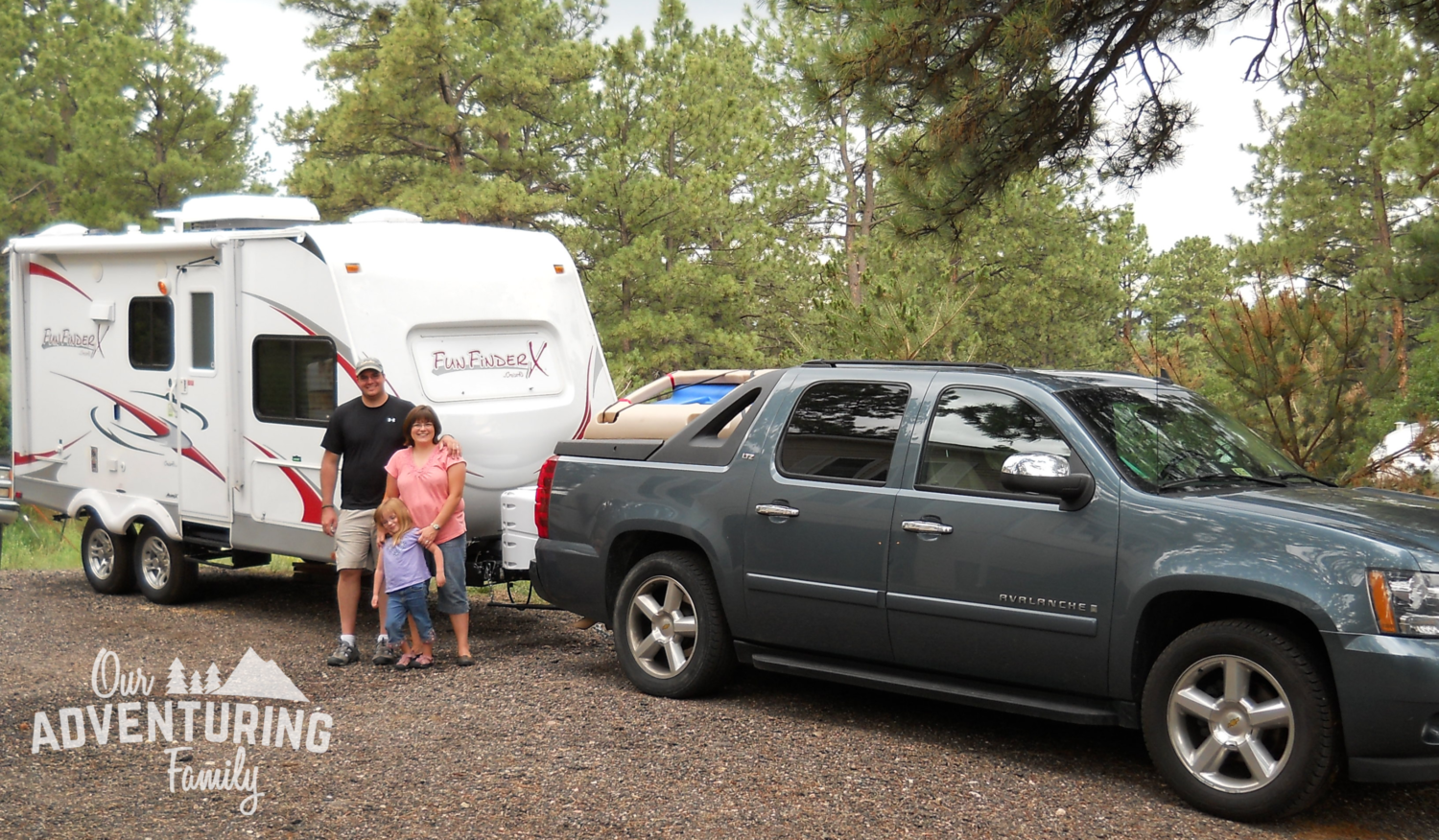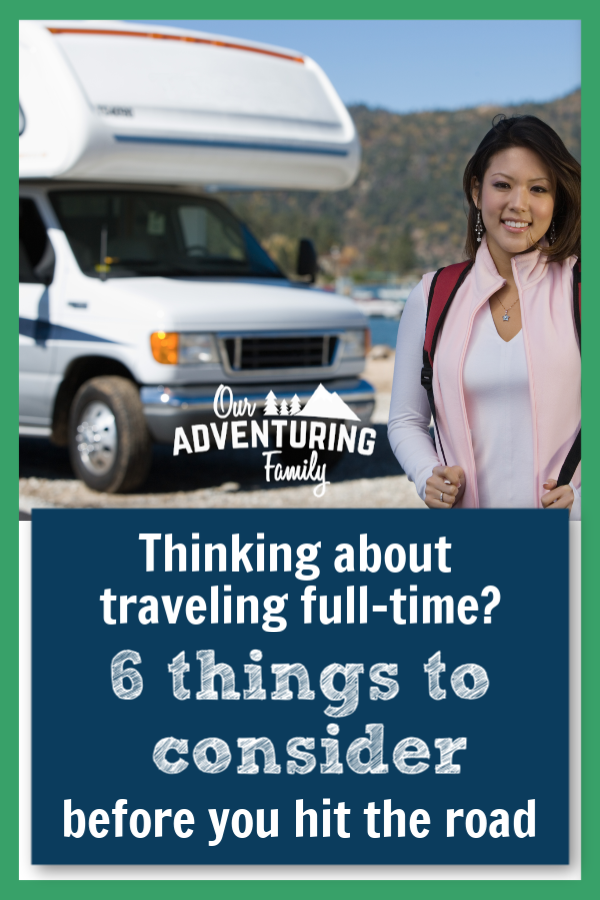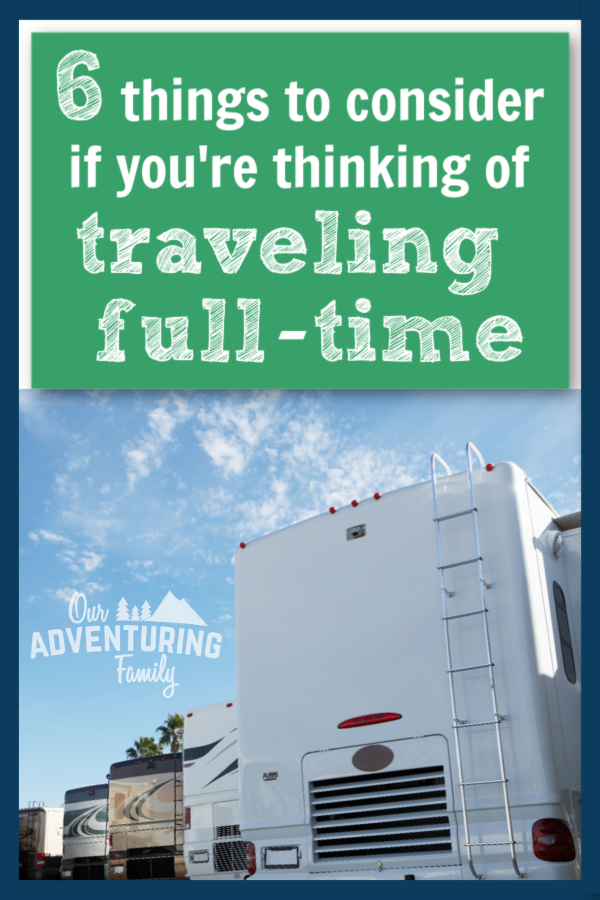This post may contain affiliate links. As an Amazon Associate I earn from qualifying purchases, but there is no additional cost for you. Please see my Disclosure page for more information.
When we bought our first travel trailer, our first trip was a 5 week cross-country trek to Utah, Idaho, and Colorado, and then back to Virginia. No weekend camping trip to break things in (our schedule didn’t allow for one), we just jumped in with both feet.
Before we hit the road, we had some trepidation about the three of us (Sunshine was 5 at the time) being in an 18′ trailer for 5 weeks. Would we hate it? Would we drive each other crazy?
When we returned, we realized it had been a good experience. We hadn’t minded spending 5 weeks together, traveling in that little trailer.

This opened up the idea of full-time travel, which we had never before considered.
I’m sure you’ve heard stories of people who decided they wanted to travel full-time, so they sold their house and all their belongings, quit their job, and bought their first RV or travel trailer, all within a very short time. As a type A planner, that sooo does not work for me. Kudos to you if it does, though.
However, for all those stories I’ve heard of individuals and families who have embarked on full-time RV life, I’ve also heard a number of stories of people who, after a couple months, or even just a couple weeks, decided it wasn’t for them, and they quit traveling full-time.
There’s nothing wrong with this, but that has got to be such a challenging situation to find yourself in. So why not do some research beforehand and find out if full-time RVing is for you before you sell everything and quit your job?
If you’ve ever thought about traveling full-time, or you just want to go on annual road trip, here’s some things to think about.
Some things to consider when deciding if full-time travel is right for you
1. Money, money, money
How will you pay for everything? Can you telecommute or otherwise work remotely? Do you have a side hustle you can take full time? Are you willing to look for work as you travel? Will you live off savings?
While some costs will probably decrease without a house in the mix, there are still a number of costs to consider, and some of them will vary depending on how fast you’re moving from one location to the next. These costs include campground fees (though you can reduce these by boondocking or working as a camp host), gas as you travel from place to place, food (will you cook from scratch, or frequently eat out?), laundry, vehicle maintenance, storage if you didn’t get rid of everything before you started traveling, and so on.
2. Are you comfortable living a minimal lifestyle?
Many of us collect stuff and when our houses and garages fill up, we go get storage units to fill up with even more stuff. RVs and travel trailers do have some storage, but part of that storage is needed for the hoses, cords, and tools needed to keep the RV clean, powered up, and running properly. Space isn’t the only issue, though. How much your stuff weighs has to be taken into account as well so you don’t overload your drivetrain (which is always a pricey repair).
Even the largest 5th wheels and class As don’t have a lot of storage. Can you live with fewer things, a smaller wardrobe, fewer shoes, a curated selection of appliances, and so on? Do your hobbies take up a lot of space? If you’re bringing kiddos along, will you be able to downsize their clothing and toys?
3. Can you handle living in a small space?
Large 5th wheels and class As have more space, but even then, you’re looking at around 400 square feet, max. If you’re in a smaller RV or trailer, your square footage will be a lot less. And if you want to live the #vanlife? Your space will be miniscule.
Will living in small quarters make you feel claustrophobic or that everyone is on top of everyone else? Do you need a quiet space to retreat to, or do you thrive in the close company of others?
Many full-time travelers spend a lot of time outdoors as a way to expand their living space. However, you’ll still be stuck inside when the weather is bad, so be sure you take that into account.
4. Can you handle living in a small space with your travel companions?
This does need to be considered separately from just living in a small space. Can you travel with your significant other/family members/pet(s)/whoever you bring along? Will they grate on your nerves? Respect your space? Clean up after themselves? (sooo important in a tiny space) Be helpful or freak out in all the situations you encounter?
Have you ever taken a road trip with an annoying person, but you didn’t know they were annoying until that road trip? Traveling full-time will amplify those irritations, so make sure you can tolerate each other.
5. Do you want to travel solo?
If so, are you confident in your abilities to learn how to do all the things? Do you feel good about camping or boondocking by yourself? You can find fantastic communities of travelers through social media- are you comfortable connecting and learning from them? Is safety an issue for you? What will you do to make sure you feel secure and safe?
6. Do you (and your travel companions) handle change well?
Travel can be slow, with long periods spent in one area; rapid, with only a night or two in each area; or anywhere in between. Regardless, there will be changes in scenery, schedule, etc. Does this throw you off, or do you thrive in it? How about your travel companions?
If you struggle to adapt to change, full-time travel will be a challenge.

So how do you find the answers to the questions above?
1. Rent an RV
If you don’t already have an RV or trailer, rent one and go on as long a trip as you can (save up your vacation days!). We’ve taken multiple 4 and 5 week road trips and they have shown us that we don’t mind being in small spaces together and we enjoy the RV lifestyle.
If you spend 2-3 weeks, or even longer, living in an RV or trailer full-time, you’ll get a good idea of whether you can handle living with minimal belongings in a confined space with your travel companions.
2. Try to travel and live as you would like to while full-timing
Our most recent road trip involved 14 hour driving days, which are just awful, but necessary given the time frame we were working with. We definitely will not be traveling like that when we go full-time. We anticipate spending a week or so in each location, with time for work, schoolwork, grocery shopping, laundry, and exploring the area.
While you’re renting that RV or trailer, travel as fast or as slow as you think you’d like to when full-timing. Try it out on a short-term basis and see how it feels. Be flexible!
3. Start downsizing now
Figure out what you’ll do with your things. Will you sell everything or store some things? Consider your timeline: do you plan to travel indefinitely, or for a set period? If you plan to travel indefinitely, storing stuff wouldn’t be a great idea as the costs add up quickly.
We’re a couple years out from being able to hit the road full-time, but we’ve already started getting rid of things. Doing it gradually makes it less painful and gives us time to think about what we really need in our life. We plan on traveling for about two years, then we’ll settle down again. Since we won’t be traveling indefinitely, we want to keep those things that will be more difficult to replace, like some of our wood furniture (nothing with upholstery) and our book collection.
What we do store will have to fit within an enclosed cargo trailer, which will help us keep our stored items to a minimum. We’ll store the trailer at my parents’ house, which will save us the cost of storage over those two years we’re traveling. And when we settle down again, it’ll be a simple matter to move our things to our new property.
4. Research the money aspect
If all signs are pointing to full-time travel being a good fit, don’t forget to make sure you know how you’ll fund your travels. If you can’t (or don’t want to) work remotely, it’s never too soon to start a side hustle. In fact, the sooner you start, the sooner you’ll be in a financial position to pursue your dreams. If you need help deciding on a side hustle, take the Side Hustle Challenge, our free email course that will help you figure out what type of side hustle will be a good fit.
If looking for gigs as you travel is more your speed, consider jobs such as camp host, pulling orders in an Amazon warehouse, helping with sugar beet or other produce harvest, photography, travel nurse, and so on.
Are you thinking about traveling full-time? What are you doing to prepare yourselves?


